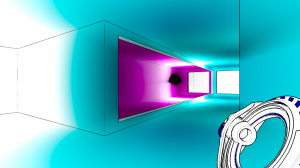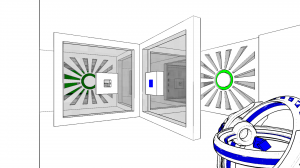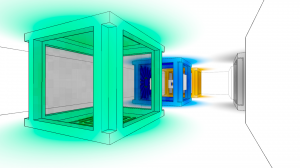 I was the guy that didn’t like Portal. Okay, so I admit the story was funny and well paced, the gameplay was original and the design of the puzzles was generally flawless, but there was just something that didn’t click for me. It was a perfectly crafted little gem of a game…. but I just couldn’t get into it. I assumed that it was because I don’t enjoy puzzles in games, and when I couldn’t solve them I felt stupid and worthless and like a failure. Then I played Antichamber, and I realised that I didn’t hate puzzle games. I also realised that feeling like you’re stupid can be…. kinda fun! And make no mistake, if you had any trouble with the puzzles in Portal and you play Anitchamber then you’d better get ready to feel really bad about your own level of intellect.
I was the guy that didn’t like Portal. Okay, so I admit the story was funny and well paced, the gameplay was original and the design of the puzzles was generally flawless, but there was just something that didn’t click for me. It was a perfectly crafted little gem of a game…. but I just couldn’t get into it. I assumed that it was because I don’t enjoy puzzles in games, and when I couldn’t solve them I felt stupid and worthless and like a failure. Then I played Antichamber, and I realised that I didn’t hate puzzle games. I also realised that feeling like you’re stupid can be…. kinda fun! And make no mistake, if you had any trouble with the puzzles in Portal and you play Anitchamber then you’d better get ready to feel really bad about your own level of intellect.
Antichamber is a first person puzzle game that plays with your preconceptions about how space and geometry work in its game world. It’s described as non-Euclidean and although it doesn’t really have a story to speak of, Antichamber is still a game you want to make sure you don’t spoil when you write about it. The reason for this is that a great deal of the fun in the game comes from discovery and it’s not the discovery of new characters or new areas that thrills either. Rather, it’s discovering how the games mechanics work. Often there are multiple solutions to a puzzle, and there is usually one very simple solution that is easy to overlook. It’s only when you start learning about the explicit rules of the games world and how to solve a difficult puzzle that you realise that some earlier puzzle had a much simpler solution. The world of Antichamber is a complex one with its own weird rules, and you’re constantly learning how these differ from the rules of our own world. There are also usually multiple puzzles that you’re stuck on at once, and when you finally solve one you can often use what you’ve learned to solve others too.
 But everything I have said about Antichamber has been a bit vague so far. I hear you say “give us more detail Tom”. Okay, let me try without giving away TOO much.
But everything I have said about Antichamber has been a bit vague so far. I hear you say “give us more detail Tom”. Okay, let me try without giving away TOO much.
In Antichamber you try to….. escape? Or find an exit? Well I think you do. You start trapped in a weird, empty environment anyway, and you move through a series of rooms and chambers (just like in that Portal game) solving puzzles in each area to progress. Each puzzle is accompanied by a little picture on the wall that changes to a little text hint when you click on it. These pieces of text act as the title for each puzzle, and as well as being hints, they also sound like little fortune cookie life lessons. For example, they say things like “Sometimes you have to go back to go forward” or “the answers are often simpler than they first appear”.
And the first thing that will hit you when you start Antichamber is how it looks. Oh God, it’s gorgeous! Using a line-drawn style with coloured lighting and clear, clean design, it’s simple but absolutely stunning. It’s amazing to think that this is made with the Unreal engine, the same engine that powers all those brown games with beefy space marines. Antichamber is so stripped back and sleek that it’s…. cool. There’s no other word for its design than that. Antichamber is cool.
 The audio is amazing too. Ambient and strange, it’s full of detail but it always stays in the background. Filled with faint melodies and environmental sounds that evoke quiet forests, birds at the seaside and rain in summer, it’s gorgeous. As the game progresses there are also some weird distant voices and creepy whispering too, and the whole tone of the audio and music becomes darker. In fact, despite the lack of anything intentionally frightening the game does get a bit unsettling later on and the world is so immersive and weird that when you fall or when something happens suddenly it can be very unnerving. You also spend a lot of the game chasing a nebulous black disturbance in space that absolutely seeps menace.
The audio is amazing too. Ambient and strange, it’s full of detail but it always stays in the background. Filled with faint melodies and environmental sounds that evoke quiet forests, birds at the seaside and rain in summer, it’s gorgeous. As the game progresses there are also some weird distant voices and creepy whispering too, and the whole tone of the audio and music becomes darker. In fact, despite the lack of anything intentionally frightening the game does get a bit unsettling later on and the world is so immersive and weird that when you fall or when something happens suddenly it can be very unnerving. You also spend a lot of the game chasing a nebulous black disturbance in space that absolutely seeps menace.
So how do the puzzles work? Well, that’s hard to explain without spoiling the game too much. They use perspective and play with our expectations about 3D space. At first you simply move around the game world to solve puzzles, finding hidden routes and pathways to progress. As you get further you unlock… tools to help you progress. While not exactly a Portal gun, you do get something vaguely similar. You won’t be creating portals, but you will be building the solutions to your problems. Again, I am being as vague as I can be to avoid spoilers, but this tool will be upgraded as you go through the game, and the puzzles that can’t be solved early on will be the ones you come back to once you have unlocked new abilities for your main “weapon”.
 All of this is wrapped up in some of the best presentation we’ve seen not just in an indie game, but in any game this year. The whole thing starts in room that has the basic instructions for how to play and the games controls written on the walls. The games menu system is also written on the walls, and clicking on this writing sets your keys, resolution and so on. It’s a really clever interface, so much so that I’m surprised I haven’t seen it in more games. This room also has the games map written on the walls and clicking on any puzzle in that map will instantly take you there. You can also warp straight back to this starting room at any time by hitting the esc key, and this happens very quickly. This is great design and helps alleviate the frustration you feel when you get stuck on a puzzle. Simply hit escape, have a look at the map and warp to a different puzzle and you’ve sidestepped a potential rage-quit situation.
All of this is wrapped up in some of the best presentation we’ve seen not just in an indie game, but in any game this year. The whole thing starts in room that has the basic instructions for how to play and the games controls written on the walls. The games menu system is also written on the walls, and clicking on this writing sets your keys, resolution and so on. It’s a really clever interface, so much so that I’m surprised I haven’t seen it in more games. This room also has the games map written on the walls and clicking on any puzzle in that map will instantly take you there. You can also warp straight back to this starting room at any time by hitting the esc key, and this happens very quickly. This is great design and helps alleviate the frustration you feel when you get stuck on a puzzle. Simply hit escape, have a look at the map and warp to a different puzzle and you’ve sidestepped a potential rage-quit situation.
Despite utilising this technique to avoid complete mental breakdown, Antichmaber will still get frustrating. By its very nature it’s a game that delights in confounding you at every step. It plays with you, messes with your head and mocks you, and unless you are mentally prepared for the head-banging keyboard-smashing difficulty it can be a rough ride. The later puzzles really layer on top of each other too, so that the solution to the next is interlaced with the solution to the last. Most painfully of all, often you won’t have the right equipment to solve a puzzle, and the game doesn’t always make this clear meaning that you can potentially waste time trying to solve a puzzle that is impossible at that point in your game.
 While the frustration you feel can be great, the emotional and intellectual satisfaction you get from solving one of the harder puzzles is indescribable. At its best Antichamber makes you feel like your brain is re-wiring itself. Your mind is twisting the universe around and perceiving reality in new ways to solve the puzzles it’s been set. In Antichamber you don’t level up your character, you level up your own mind as revelations open up your mind to new possibilities. And this satisfaction is present throughout every moment of Antichamber, even as the game subverts your expectations it also subverts its own rules. To give you an early example of a simple puzzle, at one point you are faced with two stairways, one going up and one going down. No matter which you take, you mysteriously come back to the same spot where you started. It’s not until you try going back the way you came that you realise that everything has changed and somehow you are on a new path.
While the frustration you feel can be great, the emotional and intellectual satisfaction you get from solving one of the harder puzzles is indescribable. At its best Antichamber makes you feel like your brain is re-wiring itself. Your mind is twisting the universe around and perceiving reality in new ways to solve the puzzles it’s been set. In Antichamber you don’t level up your character, you level up your own mind as revelations open up your mind to new possibilities. And this satisfaction is present throughout every moment of Antichamber, even as the game subverts your expectations it also subverts its own rules. To give you an early example of a simple puzzle, at one point you are faced with two stairways, one going up and one going down. No matter which you take, you mysteriously come back to the same spot where you started. It’s not until you try going back the way you came that you realise that everything has changed and somehow you are on a new path.
Most amazing of all, this sunningly complete game has been made by a tiny team of just a few dedicated individuals. Antichamber is full of complex, involving and brilliant puzzles, gorgeous, ambient atmospheric music and it’s one of the most strikingly beautiful games you’ll find on Steam. What an achievement. What an amazing game.
9 puzzlers I personally prefer to Portal out of 10
